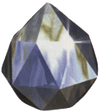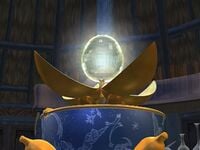Crystal Coconut: Difference between revisions
No edit summary |
m (Text replacement - "(\| *)Jap([RMCN\d]* *=)" to "$1Jpn$2") |
||
| (One intermediate revision by one other user not shown) | |||
| Line 33: | Line 33: | ||
==Names in other languages== | ==Names in other languages== | ||
{{Foreign names | {{Foreign names | ||
| | |Jpn=クリスタル ココナッツ | ||
| | |JpnR=Kurisutaru Kokonattsu | ||
| | |JpnM=Crystal Coconut | ||
|ChiS=水晶椰子 | |ChiS=水晶椰子 | ||
|ChiSR=Shuǐjīng Yēzi | |ChiSR=Shuǐjīng Yēzi | ||
| Line 57: | Line 57: | ||
{{DKBB}} | {{DKBB}} | ||
[[Category:Crystals]] | [[Category:Crystals]] | ||
[[Category:Coconuts]] | |||
[[Category:Collectibles]] | [[Category:Collectibles]] | ||
[[Category:Donkey Kong items]] | [[Category:Donkey Kong items]] | ||
Latest revision as of 13:30, January 7, 2025
| Crystal Coconut | |
|---|---|
 A Crystal Coconut from Donkey Kong 64 | |
| First appearance | Donkey Kong Country – "Bad Hair Day" (1996) |
| Latest appearance | Donkey Kong Barrel Blast (2007) |
- “It's magical, it's mysterious! It's the eighth-and-a-half wonder of the world, the Crystal Coconut! This is no ordinary crystal! It's a fortune-teller! A teleporter! A power supplier and a wish fulfiller! In other words… whoever's got the coconut rules!”
- —Cranky Kong, "Bad Hair Day"
A Crystal Coconut is an object found in the Donkey Kong franchise. It is introduced in the Donkey Kong Country television series as a singular, plot-important magical artifact. In their game appearances, Crystal Coconuts are recurring collectable items rather than a single entity.
History[edit]
Donkey Kong Country television series[edit]
In the Donkey Kong Country TV series, the Crystal Coconut was stolen from an unknown source by the great-great-great-grandfather of one of the show's main characters, Kaptain Skurvy. Skurvy's great-great-great-grandfather hid the coconut on Kongo Bongo Island, specifically in the eye of the mystical idol Inka Dinka Doo. However, after many years, the coconut popped out of its hiding place and is found by Donkey Kong, who is then proclaimed the future ruler of Kongo Bongo Island. The show's main antagonists, King K. Rool and the aforementioned Kaptain Skurvy, constantly try to steal the coconut from the Kongs; the former wants to use it to take over Kongo Bongo Island; the latter believes it is his birthright as his ancestor stole the coconut, and seems to want to use it to "rule the seven seas" as well.
The coconut's powers in the show are inconsistent and range widely, as it primarily serves as a plot device. It is known to be able to heal wounds, turn people invisible, freeze time (though living animals are unaffected), put someone in an endless sleep, and serve as a crystal ball that characters use for scrying. Occasionally, the coconut projects images on its own, often warning the Kongs when Kaptain Skurvy and his crew are returning to Kongo Bongo Island, which suggests that the coconut is an intelligent sentient being. Cranky Kong seems to be able to use the coconut to astral project to different places, though he must always return to where the coconut is, even if it has been removed from its original location. For the duration of the show, the Crystal Coconut is kept in Cranky Kong's Cabin, inside a safe disguised as a celestial globe. The only way to open the safe is for Cranky to tap his cane on the ground, but many times Cranky opens the safe unintentionally.
Donkey Kong 64[edit]
In Donkey Kong 64, Crystal Coconuts are used as fuel for each Kong's Kong Barrel ability and the Super Slam attack. For example, Donkey Kong's Strong Kong ability allows him to become invincible, but uses up Crystal Coconuts. They are semi-common items that appear in most levels, especially in areas requiring the Kongs to use their ability. When a Kong learns their ability from Cranky's Lab, the Crystal Coconuts become activated. At first, the Kongs can only carry up to 20 Crystal Coconuts, though for each Banana Fairy captured, one more gets added to their maximum. By capturing all 20 Banana Fairies, the Kongs can carry up to 40 Crystal Coconuts, exactly double of the default limit. Capturing every Banana Fairy unlocks a cheat from the Mystery menu that allows for infinite Crystal Coconuts to be used, though in certain cases, such as the final battle against King K. Rool, the Kongs already use their Kong Barrel ability on an infinite supply of Crystal Coconuts.
DK: King of Swing[edit]
In DK: King of Swing, Crystal Coconuts mostly appear in bonus stages. Collecting all of them unlocks Wrinkly Kong in the Jungle Jam mode. These can only be collected as Donkey Kong; they do not appear in Diddy Mode since it has no bonus stages.
Donkey Kong Barrel Blast[edit]
Crystal Coconuts also appear in the game Donkey Kong Barrel Blast. They are one of the items that come out of red balloons. If the player gets one, they will be invincible, have unlimited Wild Moves and can also hurt other racers by simply touching them, similar to a Super Star in the Mario Kart series. Unlike most other items obtained from a red balloon, it does not get an effect boost if a Kong uses one.
Profiles[edit]
DK: King of Swing[edit]
Website bio: "Crystal Coconuts are usually hidden in barrels. If you miss one in a level, replay the level until you find the gemmed fruit of choice."
Names in other languages[edit]
| Language | Name | Meaning | Notes |
|---|---|---|---|
| Japanese | クリスタル ココナッツ[?] Kurisutaru Kokonattsu |
Crystal Coconut | |
| Chinese (simplified) | 水晶椰子[?] Shuǐjīng Yēzi |
Crystal Coconut | |
| Italian | Noce di Cocco di Cristallo[1] | Crystal Coconut | Donkey Kong 64 |
| Cristallo di cocco[2][3] | Crystal coconut | DK: King of Swing, Donkey Kong Jet Race | |
| Portuguese (NOA) | Coco de Cristal[?] | Crystal Coconut | |
| Spanish | Cocodiamante[?] | From coco ("coconut") and diamante ("diamond") |
References[edit]
- ^ Donkey Kong 64 English-Italian manual. Page 35.
- ^ DK: King of Swing European manual. Page 108-109.
- ^ Donkey Kong Jet Race Italian manual. Page 16.
| Donkey Kong Barrel Blast | ||
|---|---|---|
| Playable characters |
Kongs | Donkey Kong (Ultra Barrel) • Diddy Kong • Dixie Kong • Lanky Kong • Tiny Kong • Funky Kong • Wrinkly Kong • Cranky Kong |
| Kremlings | Kritter • Kip • Kass • Klump • Kalypso • Kludge • Kopter • King K. Rool | |
| Non-playable character | Candy Kong | |
| Cups | Topaz Cup | DK Jungle • Salty Sea • Mt. Dynamite |
| Sapphire Cup | Scorching Canyon • DK Jungle Falls • Shimmering Sea • Mammoth Glacier | |
| Diamond Cup | Open Ocean • Mt. Dynamite Remix • Parched Palace • Cranky's Temple | |
| Platinum Cup | Dynamite Run • DK Jungle Sunset • Alpine Peak • Temple Heights • Cosmic Highway | |
| Other | Gallery | |
